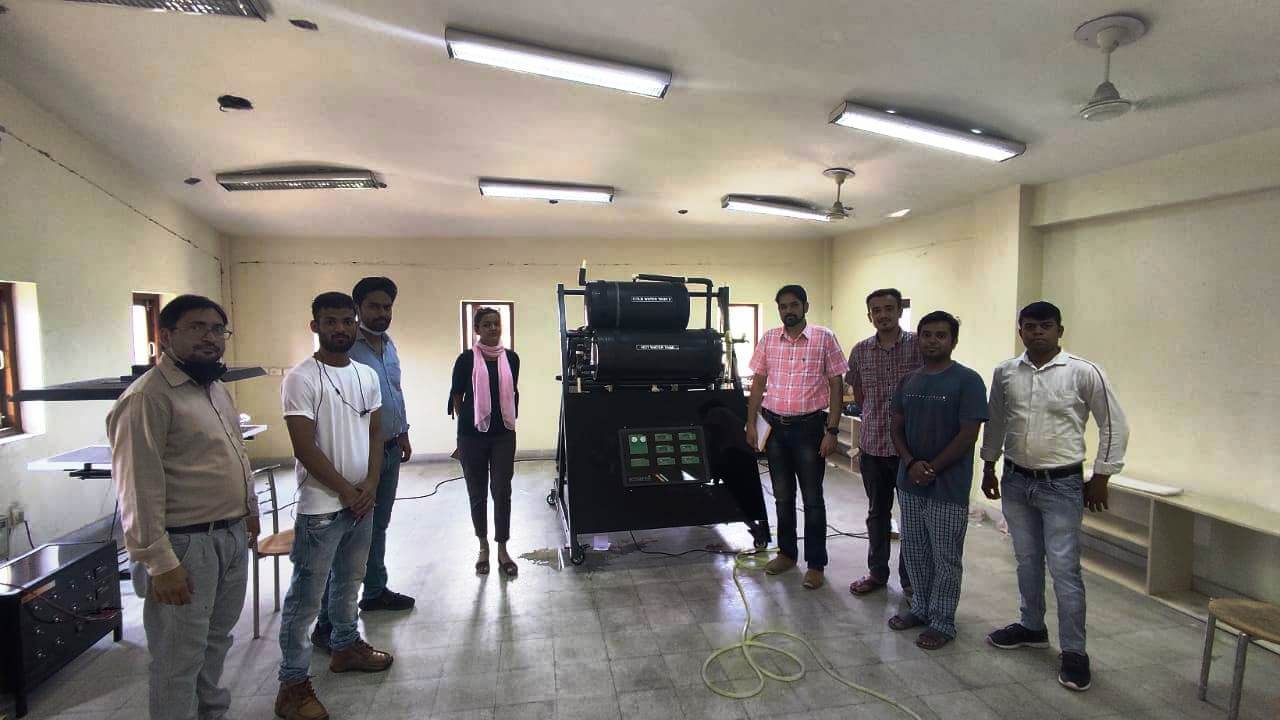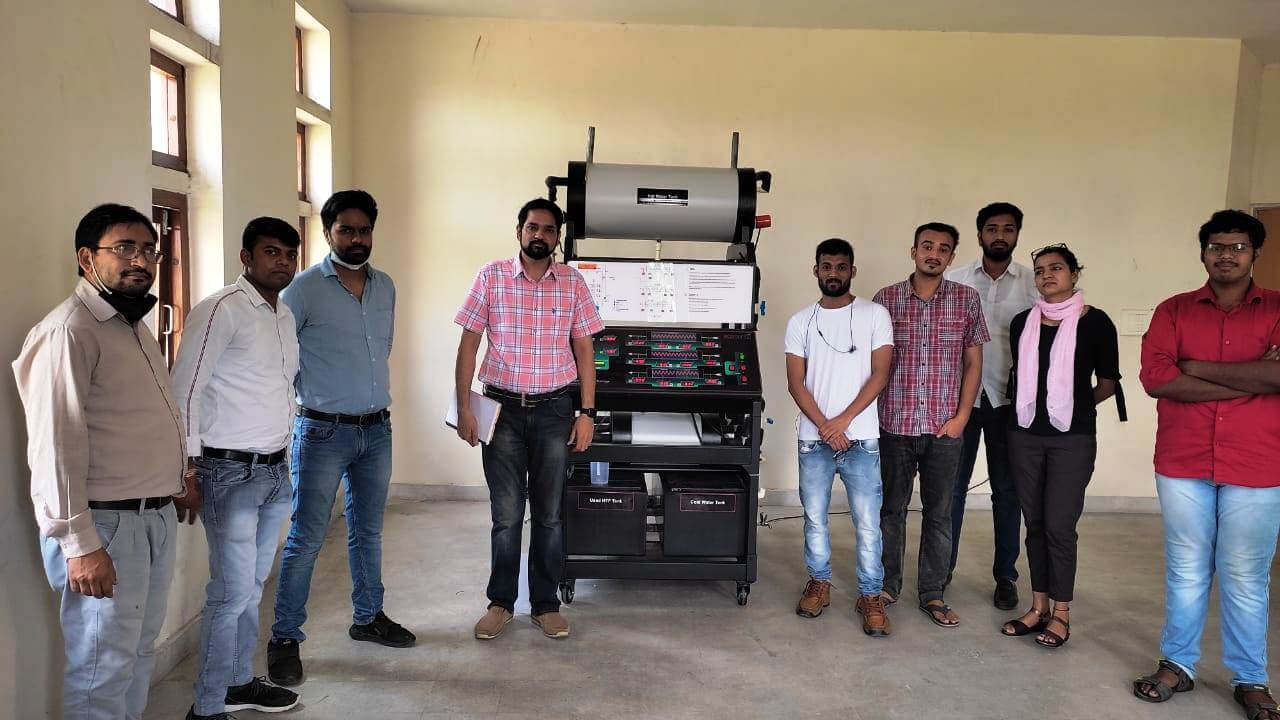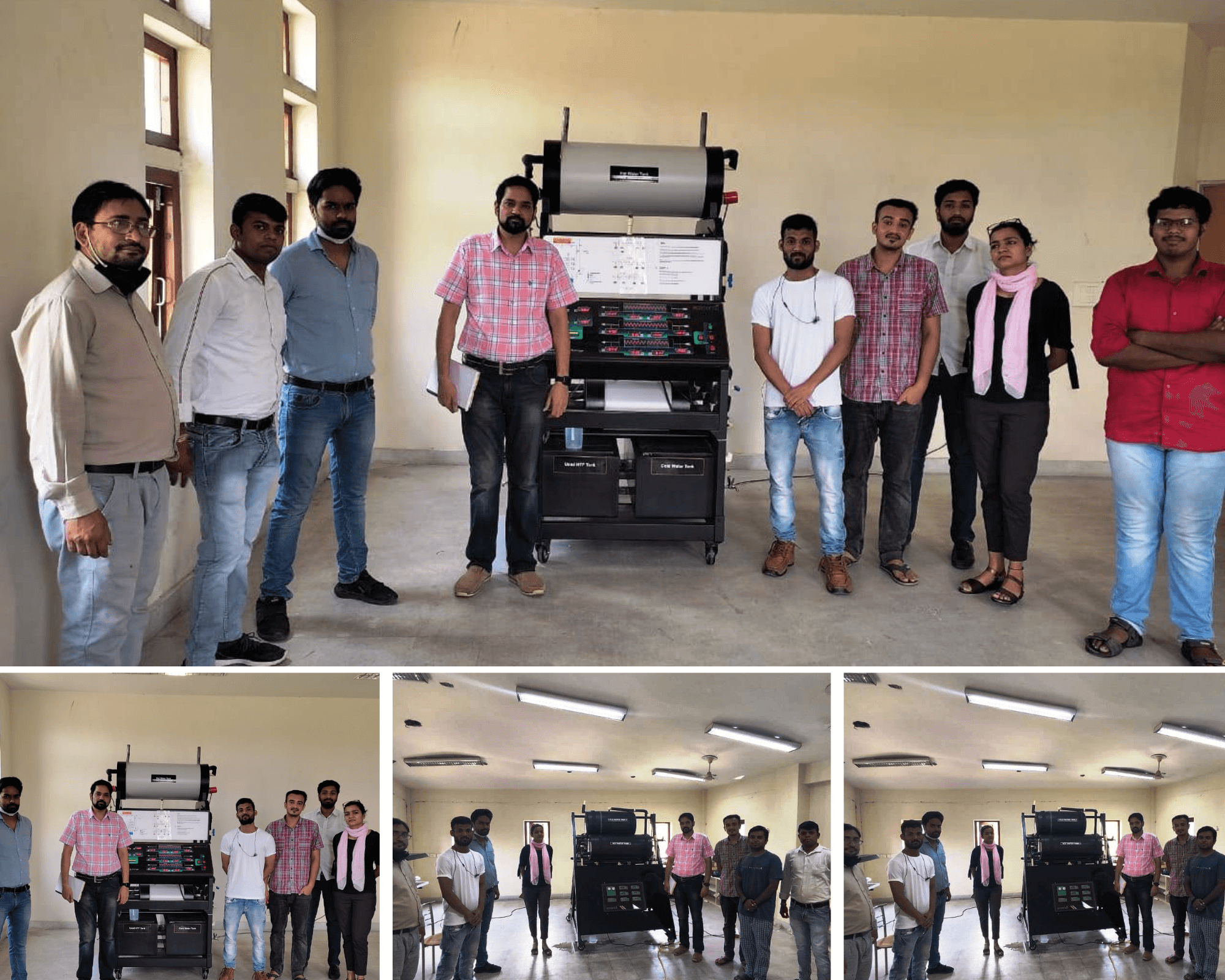Sardar Swaran Singh National Institute of Renewable Energy (SSS-NIRE), Kapurthala (Punjab) is an autonomous Institution of the Ministry of New and Renewable Energy, Government of India. The objective of the Institute is to carry out and facilitate research, design, development, testing, standardization and technology demonstration eventually leading to commercialization of R&D output.
SSS-NIRE has three R&D Laboratories. Ecosense established Solar Thermal Lab at SSS-NIRE’s R&D Lab-III.
Under Solar Thermal Lab, Ecosense installed the following equipments:
1. Solar Thermal Training System
2. Thermal Energy Storage System
1. Solar Thermal Training System
Solar Thermal Training System allow them to learn about Solar Thermal technology by using a real time miniaturized thermal plant inside the laboratory. As Solar Thermal systems highly dependent on environmental conditions for its operation because it uses Sun’s Irradiation as heating source, Ecosense’s Solar Thermal Training system uses artificial source of irradiation instead of actual sunlight for the operation of equipment which allows user to experiment and conduct research on Solar Thermal technology at any time of the day.
Using this system users can learn about two modes of water heating using Flat Plate Collector 1) natural mode of water heating i.e., Thermosyphonic mode and 2) Forced mode of water heating. In Thermosyphonic mode water rises in the riser tubes of Flat plate collectors naturally but it takes much time to heat a very less amount of water whereas in forced mode of heating water is regulated to the riser tubes using a motor, which heats up the larger amount of water present in the overhead tank but heating temperature will be less than that in Thermosyphonic mode.
Advantages of Solar Thermal Training System
• Artificial source of irradiation
• Control of irradiation level as per requirement
• Artificial source of wind speed
• Inbuilt facility analogous to rooftop and hot water tank compatible to perform experiments both indoor and outdoor.
• 2 auxiliary tanks for non-stop experimentation
• Provision to change incident angle of irradiation

Fig. 1 Demonstration of Solar Thermal Training System
2. Thermal Energy Storage System
The thermal energy storage (TES) can be defined as the temporary storage of thermal energy at high or low temperatures. The TES is not a new concept, and at has been used for centuries. Energy storage can reduce the time or rate mismatch between energy supply & demand and it plays an important role in energy conservation. Energy storage improves performance of energy systems by smoothing supply and increasing reliability. For example, storage would improve the performance of a power generating plant by load leveling. The higher efficiency would lead to energy conservation and improve cost effectiveness. Some of the renewable energy sources can only provide energy intermittently. Although the sun provides an abundant, clean and safe source of energy, the supply of this energy is periodic following yearly and diurnal cycles; it is intermittent, often unpredictable and diffused. Its density is low compared with the energy flux densities found in conventional fossil energy devices like coal or oil-fired furnaces. The demand for energy, on the other hand, is also unsteady following yearly and diurnal cycles for both industrial and personal needs. Therefore, the need for the storage of solar energy cannot be avoided.
This system has been designed to perform TES related experiment by using PCM materials. As there are several types of PCM, the system has been designed to perform experiment with at least two PCM separately. Provision is also kept to examine the combine (known as cascading) effect of two PCMs in thermal energy storage. To visualize the phase changes in the material another set of arrangement are there in the system.
Advantages of Ecosense’s Thermal Energy Storage System:
• Apart from the standard learning outcomes, a user can also explore the following research options with the system
• Performance analysis of paraffin wax based latent heat thermal energy storage systems with different heat exchangers: an experimental study
• Experimental study of a latent heat thermal energy storage system with different types of insulation (PUF, Rockwool and Glass-wool) having Paraffin wax and Organic mixtures in series combination (cascading)
• Experimental study of latent heat thermal energy storage system with multiple PCMs in series combination
• Performance analysis of a Fatty acid based thermal energy storage system with different insulating materials: an experimental study
• Performance behavior of fatty acid based thermal energy storage system with and without aluminum additive: An experimental study
• Experimental analysis of a multiple PCM based LHTES system with three different types of heat exchangers and solar parabolic trough collector as a source of heat
• Experimental study of a small scale solar parabolic trough collector and latent heat thermal energy storage combine system with multiple PCMs in a storing unit

Fig. 2 Demonstration of Thermal Energy Storage System
Master’s Training Conducted
After successful installation of systems, 2-day master’s training program is conducted. This master’s training was focused on how to efficiently utilize the system in core-curriculum development and practical experimentations.

Fig. 3 Glimpses of Masters Training
Program Outcomes
The faculty members and students really enjoyed our two-day training programme and loved to work on our lab equipment. Professors will further conduct experiments on the system to understand it more deeply and incorporate this lab set up as part of their regular curriculum.
